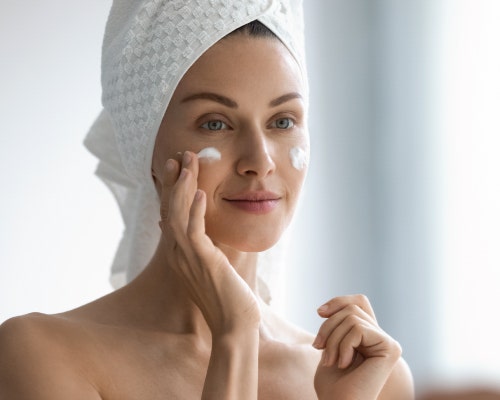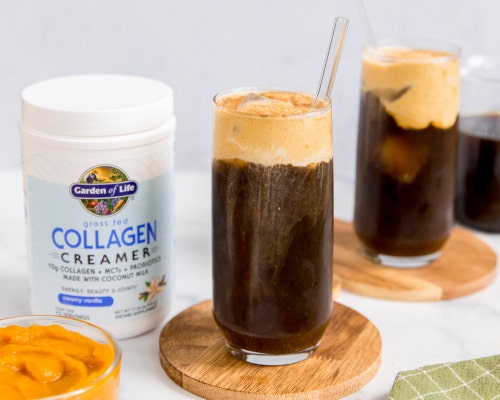How to Support Your Skin Health With Your Diet
- 4/26/24


Many of us wish we could have more control over the appearance of our skin as we age. After all, skin is our largest organ and among the first things people see. As years go by, we naturally lose skin moisture and the ability to produce as much collagen, the protein responsible for skin elasticity and firmness. This affects skin elasticity, appearance, and health.
Crow’s feet and laugh lines can represent wisdom and a joy-filled life, but that doesn’t mean you’d mind keeping them at bay for a while. We can’t dictate aging, but we can do things that help keep our skin as youthful as possible — starting with our diet food. Think of a skin-healthy diet as the ideal skincare routine, from the inside out.
The Link Between Diet and Skin Health
The saying, “You are what you eat”, may not be literal. However, it does illustrate how the foods we’re consuming impact health and wellness. This includes the outward appearance of our skin. Certain foods offer nutrients that promote healthy skin, while other foods have the opposite effect. This is partly through the way they impact our skin microbiome, or the community of microbes that live on our skin and keep it healthy.
For example, fruits, vegetables, whole grains, nuts, seeds, and legumes are rich in vitamins, minerals, fiber, unsaturated fats, and antioxidants that your skin loves. On the other hand, ultra-processed foods that are high in saturated fat, sodium, and added sugar tend to be high in calories, low in nutrition, and pro-inflammatory to your skin.
Important Nutrients for Skin Health
Antioxidants
Antioxidants are compounds that help protect your cellular health. Without antioxidants, we’re more prone to skin damage and accelerated aging as a result of our exposure to things like cigarette smoke, environmental pollutants, and even foods we eat. They can even provide some UV protection.
Fortunately, there are plenty of antioxidant-rich foods. Fruits and vegetables are exceptionally rich in antioxidants. Incorporate a variety of sources, like broccoli, tomatoes, watermelon, berries, oranges, apples, and spinach.
Omega-3 Fatty Acids
Omega-3 fatty acids may help support a healthy inflammatory response and a healthy skin barrier function. Some of the best sources of omega-3s include fatty fish (e.g., salmon, tuna, halibut), flax seeds, chia seeds, and walnuts.
If you don’t eat many of these foods, you might consider an omega-3 supplement. These can be derived from fish or algae if you’re seeking a vegan DHA.
Vitamins and Minerals
Getting an abundance of micronutrients is important to help protect and optimize skin health. Vitamins and minerals can help provide UV protection, support skin integrity, and have antimicrobial benefits for the skin.
Including a variety of fruits, veggies, lean proteins, nuts, seeds, grains, and legumes ensures you’re getting vitamins C, A, E, and zinc. Vitamin C also supports collagen production.
Water
Staying hydrated helps maintain the moisture balance, suppleness, and elasticity of your skin. Hydration may also help reduce the appearance of fine lines and wrinkles.
If you find it hard to stay hydrated, try filling a reusable water bottle in the morning to keep with you and sipping on it as the day goes on. Try infused water by adding things like lemon wedges or berries.
Skin Health Supplements
In addition to nourishing your skin well through a healthy diet, certain supplements may also have a place, such as:
Collagen
As collagen production slows, collagen supplements may be helpful. Replenishing collagen levels in the skin may help reduce the appearance of wrinkles and fine lines. Additionally, collagen supplements may support skin hydration and elasticity, improving overall skin texture and resilience against environmental stressors.
Biotin
Biotin, also known as vitamin B7, supports the production of keratin, a protein needed for maintaining the strength, structure, and repair of your skin. While more research is needed, a lack of biotin may be associated with skin problems.
Some people choose to take biotin and collagen together to optimize their benefits, as there aren’t many foods rich in either nutrient. Consider Garden of Life Beets Beauty Gummies and choose from a variety of grass-fed collagen powders.
References
-
Cao C, Xiao Z, Wu Y, Ge C. Diet and Skin Aging-From the Perspective of Food Nutrition. Nutrients. 2020;12(3):870. Published 2020 Mar 24. doi:10.3390/nu12030870
-
Yang Y, Qu L, Mijakovic I, Wei Y. Advances in the human skin microbiota and its roles in cutaneous diseases. Microb Cell Fact. 2022;21(1):176. Published 2022 Aug 29. doi:10.1186/s12934-022-01901-6
-
Shi Z, Wu X, Yu S, et al. Short-Term Exposure to a Western Diet Induces Psoriasiform Dermatitis by Promoting Accumulation of IL-17A-Producing γδ T Cells. J Invest Dermatol. 2020;140(9):1815-1823. doi:10.1016/j.jid.2020.01.020
-
Ratanapokasatit Y, Laisuan W, Rattananukrom T, Petchlorlian A, Thaipisuttikul I, Sompornrattanaphan M. How Microbiomes Affect Skin Aging: The Updated Evidence and Current Perspectives. Life (Basel). 2022;12(7):936. Published 2022 Jun 22. doi:10.3390/life12070936
-
Michalak M, Pierzak M, Kręcisz B, Suliga E. Bioactive Compounds for Skin Health: A Review. Nutrients. 2021;13(1):203. Published 2021 Jan 12. doi:10.3390/nu13010203
-
Thomsen BJ, Chow EY, Sapijaszko MJ. The Potential Uses of Omega-3 Fatty Acids in Dermatology: A Review. J Cutan Med Surg. 2020;24(5):481-494. doi:10.1177/1203475420929925
-
Park K. Role of micronutrients in skin health and function. Biomol Ther (Seoul). 2015;23(3):207-217. doi:10.4062/biomolther.2015.003
-
Pullar JM, Carr AC, Vissers MCM. The Roles of Vitamin C in Skin Health. Nutrients. 2017;9(8):866. Published 2017 Aug 12. doi:10.3390/nu9080866
-
Akdeniz M, Tomova-Simitchieva T, Dobos G, Blume-Peytavi U, Kottner J. Does dietary fluid intake affect skin hydration in healthy humans? A systematic literature review. Skin Res Technol. 2018;24(3):459-465. doi:10.1111/srt.12454
-
Palma L, Marques LT, Bujan J, Rodrigues LM. Dietary water affects human skin hydration and biomechanics. Clin Cosmet Investig Dermatol. 2015;8:413-421. Published 2015 Aug 3. doi:10.2147/CCID.S86822
-
Choi FD, Sung CT, Juhasz ML, Mesinkovsk NA. Oral Collagen Supplementation: A Systematic Review of Dermatological Applications. J Drugs Dermatol. 2019;18(1):9-16.
-
Patel DP, Swink SM, Castelo-Soccio L. A Review of the Use of Biotin for Hair Loss. Skin Appendage Disord. 2017;3(3):166-169. doi:10.1159/000462981
-
Zempleni J, Wijeratne SS, Hassan YI. Biotin. Biofactors. 2009;35(1):36-46. doi:10.1002/biof.8





